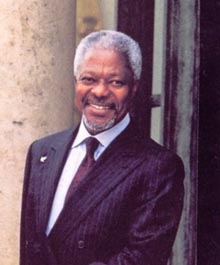
Kofi Annan
We the Peoples
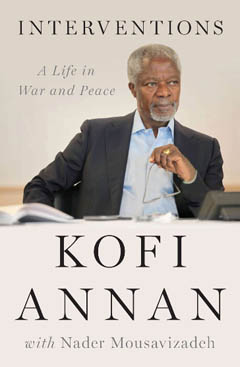
No institution has considered the extent of human conflict, survival, and aspirations as the United Nations. Throughout its history the UN has
represented the nexus of events that define the modern world. During a lifetime dedicated to the service of this organization, Kofi Annan was
present for all of these events, becoming directly involved in their outcomes during a decade as Secretary General. Interventions: A Life in War and Peace is his
personal account of an extraordinary career as an international diplomat and an accomplished world leader.
This memoir fulfills many perspectives. For the student of history, it provides an accurate first-hand depiction of the people and places that
were at the center of the headlines. For those involved in international relations, the descriptions and interpretations of positions taken by
different parties offer valuable insights into the behaviours of both state and non-state actors. For citizens of any nation, this book
will enlighten the reader with details that often extend beyond the official version of events.
As the title implies, Interventions is intended to open a discussion about the role of the United Nations in the contemporary world.
The book delves precipitously into the responses of the international community to many different situations that arose from disparate causes.
It offers no ready-made solutions to the conflicts and challenges that the world will continue to face in the years to come. Yet by examining the
handling of past situations, it prepares us to meet those challenges more effectively and guides us to avoid the pitfalls that have resulted
from inaction and a lack of international will.
Building upon the legacy established by his predecessors Dag Hammarskjold and U Thant,
Kofi Annan made great strides towards restoring the United Nations Organization to its founding
vision. Throughout his 44 year tenure at the UN, and under his leadership as Secretary General,
Kofi Annan guided the organization
through the treacherous political landscape that was very familiar to
his predecessors, while strengthening its ability to meet the challenges of the future.
Kofi Annan is an alumnus of the International School of Geneva,
having served on the Ecolint Board from 1981 to 1983. He also served as
Chairman of the Board of Trustees of the United Nations International
School in New York from 1987 to 1995. This commitment to education is
shared by his very talented wife Nane, who has worked extensively
throughout the world in support of the world's children.
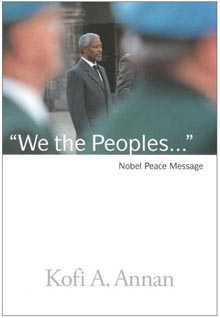
In recognition of his life-long achievements in the cause of peace, Kofi Annan was awarded the
Nobel Peace Prize in 2001 together with the United Nations Organization. In accepting the Nobel prize
he spoke on behalf of his colleagues throughout the world who have devoted, and have often given their lives
in the cause of peace. He noted that, while nations erect many monuments to wars, there are no monuments to peace.
What the world does have is the Nobel Prize.
In pursuit of this vision, Kofi Annan places human beings at the center of his work,
from conflict prevention to economic development to human rights. For him, real and lasting improvement
in the lives of individuals is the measure of all that the United Nations Organization performs.
Far from being simply an abstract notion, peace is a real and tangible state that ensures every human being a life
of dignity and security in their daily existence.
The role he promotes for individual men and women to bring to bear upon nation states the responsibility for ensuring peace within, and between, nations is reflected in these excerpts from his Nobel Lecture:
From this vision of the role of the United Nations in the next century flow three key priorities for the future: eradicating poverty, preventing conflict, and promoting democracy. Only in a world that is rid of poverty can all men and women make the most of their abilities. Only where individual rights are respected can differences be channelled politically and resolved peacefully. Only in a democratic environment, based on respect for diversity and dialogue, can individual self-expression and self-government be secured, and freedom of association be upheld.
Throughout my term as Secretary-General, I have sought to place human beings at the centre of everything we do - from conflict prevention to development to human rights. Securing real and lasting improvement in the lives of individual men and women is the measure of all we do at the United Nations.
. . .
The idea that there is one people in possession of the truth, one answer to the world's ills, or one solution to humanity's needs, has done untold harm throughout history - especially in the last century. Today, however, even amidst continuing ethnic conflict around the world, there is a growing understanding that human diversity is both the reality that makes dialogue necessary, and the very basis for that dialogue.
We understand, as never before, that each of us is fully worthy of the respect and dignity essential to our common humanity. We recognize that we are the products of many cultures, traditions and memories; that mutual respect allows us to study and learn from other cultures; and that we gain strength by combining the foreign with the familiar.
. . .
Each of us has the right to take pride in our particular faith or heritage. But the notion that what is ours is necessarily in conflict with what is theirs is both false and dangerous. It has resulted in endless enmity and conflict, leading men to commit the greatest of crimes in the name of a higher power.
It need not be so. People of different religions and cultures live side by side in almost every part of the world, and most of us have overlapping identities which unite us with very different groups. We can love what we are, without hating what - and who - we are not. We can thrive in our own tradition, even as we learn from others, and come to respect their teachings.
Kofi Annan, Nobel Lecture, Oslo, December 10, 2001
[ Full Text of the 2001 Nobel Lecture ]
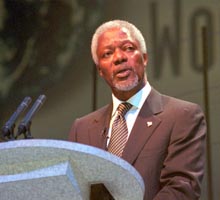
This theme is reiterated during his frequent public appearances, both in formal
settings and in public forums. At the January 2006 World Economic Forum in Davos
Kofi Annan addressed the plenary session with a speech outlining the progress being made
towards a "New Mindset for the United Nations."
The mindset that he seeks to change is one which views international relations as nothing more than relations between States, with the United Nations acting as little more than a trade union for governments. Instead, his goal is for the United Nations to chart a course for the organization that reflects the realities of the 21st century and to fulfill its mandate by engaging directly with the people of the world.
By cultivating contacts amongst a wide range of educators, private sector professions, individual citizens, and also with those actors who are less benign, Kofi Annan stresses the need to learn from their views and to encourage people to use their talents for the public good. This ultimately will help to transform all international organizations within the United Nations rubric to become more transparent and comprehensible to the public, and thereby more genuinely accountable.
That is why I have repeatedly urged all the organs of the United Nations to be more open to civil society, so that their decisions can fully reflect the contribution made by groups and individuals who devote themselves to studying specific problems, or working in specific areas. . . .
This new mindset must also extend to the domain of international peace and security so that we think of security not only in conventional terms, focusing on prevention of war between States, but also as including the protection of the world's peoples, against threats which, to many of them today, seem more immediate and more real. . . .
The United Nations cannot stand still, because the threats to humanity do not stand still. Every day the world presents new challenges, which the founders of the UN 60 years ago could never have anticipated. Whether it is a looming crisis over Iran and its compliance with the Nuclear Non-Proliferation Treaty, continuing atrocities in Darfur, or the threat of an avian flu pandemic, people all over the world look to the United Nations to play a role in making peace, protecting civilians, improving livelihoods, promoting human rights and upholding international law. I have worked long and hard to transform the United Nations so that when called upon, as we are every day, we will deliver what is asked of us effectively, efficiently and equitably. That is the true objective of the changes I have sought to bring about, and it will be the true measure of my success or failure.
Kofi Annan, World Economic Forum, Davos, January 2006
[ Full Text of the January 2006 Davos Address ]
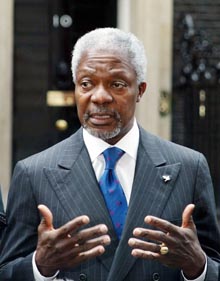
In his final public address before leaving office, Kofi Annan points to five lessons that he learned during his 10 years as Secretary General: (1) Collective Responsibility, where the security of every one of us is linked to that of everyone else; (2) Global Solidarity, where we are not only all responsible for each other's security, we are also responsible for each other's welfare; (3) The Rule of Law, where both security and development ultimately depend on respect for human rights and the rule of law; (4) Mutual Accountability, where governments must be accountable for their actions in the international arena, as well as in the domestic one; and, (5) Multilateralism, where these lessons can be accomplished only by working together through a multilateral system.
He reflects upon the continuing threats to an open society from many sources, including poverty, disease, aggression, and crimes against humanity; threats which demand that global challenges be confronted through concerted action at all levels of civilization.
Against such threats as these, no nation can make itself secure by seeking supremacy over all others. We all share responsibility for each other's security, and only by working to make each other secure can we hope to achieve lasting security for ourselves.
In fact, it is only through multilateral institutions that states can hold each other to account. And that makes it very important to organize those institutions in a fair and democratic way, giving the poor and the weak some influence over the actions of the rich and the strong.
Kofi Annan, Truman Presidential Museum and Library, Independence, Missouri, December 2006
[ Video of the Truman Library Speech ]
[ Full Text of the Truman Library Speech ]
Kindle eBook Editions:
We the Peoples: A UN for the Twenty-First Century
Interventions: A Life in War and Peace
Kofi Annan Farewell Speech [Unabridged] [Audible Audio Edition]
Combating Racism and Xenophobia: Transatlantic and International Perspectives
From amazon.com (USA):
We the Peoples: A UN for the Twenty-First Century
Interventions: A Life in War and Peace
We the Peoples: The Nobel Lecture Given by The 2001 Nobel Peace Laureate Kofi Annan
Prevention of Armed Conflict
The End of Polio: A Global Effort to End a Disease by Sebastio Salgado, Kofi A. Annan, Siddharth Dube, Mark Dennis, Christine McNab
Confronting Anti-Semitism: Essays by Kofi A. Annan, Elie Wiesel, et al
Pandemic: Facing AIDS by Kofi Annan, Nadine Gordimer, Rory Kennedy
Basic Facts About the United Nations
Partnerships for Global Community: Annual Report on the Work of the Organization 1998
Renewal Amid Transition: Annual Report of the Work of the Organization 1997
Articles and Speeches by Kofi Annan
From amazon.com (USA):
Global Values
A new mindset for the United Nations
Strategies for world peace: the view of the UN secretary-general
A pillar of support: Kofi Annan's address to the Canadian Parliament
Development without Borders: An article from: Harvard International Review
Democracy as an international issue: An article from: Global Governance
Combating Islamophobia depends on unlearning intolerance : An article from: UN Chronicle
Books with contributions by Kofi Annan
from amazon.com (USA):
A Voice for Human Rights, by Mary Robinson
The Circle of Empowerment: Twenty-five Years of the UN Committee on the Elimination of Discrimination against Women, edited by Hanna Beate Schopp-Schilling
Kings of Peace, Pawns of War: the untold story of peace-making, by Harriet Martin
For a Better World: Posters from the United Nations, by Edward B. Marks
The Media and the Rwanda Genocide, edited by Allan Thompson
Secretary or General? : The UN Secretary-General in World Politics, edited by Simon Chesterman
Protecting the Ozone Layer: The United Nations History, by Stephen O. Andersen, K. Madhava Sarma
The Challenge of Slums: Global Report on Human Settlements 2003, by UN-HABITAT
The U.N. Building, by Ben Murphy
Cities in a Globalizing World: Global Report on Human Settlements 2001, edited by Willem van Vliet
The Turbulent Decade: Confronting the Refugee Crises of the 1990s, by Sadako Ogata
The Pan-Africanists
Sharing the Front Line and the Back Hills: International Protectors and Providers : Peacekeepers, Humanitarian Aid Workers and the Media in the Midst of Crisis, edited by Danieli Yael
Water for People, Water for Life: The United Nations World Water Development Report by The United Nations
Below, by Tim Corballis
Human Security and the New Diplomacy: Protecting People, Promoting Peace, edited by Robert Grant McRae and Don Hubert
United Nations Peace - Keeping
Economic And Social Survey of Asia And the Pacific 2006: Energizing the Global Economy
State of the World's Children, with foreword by Kofi Annan
From amazon.com (USA):
State of the World's Children, by Carol Bellamy
State of the World's Children 2001: Early Childhood, by Carol Bellamy
State of the World's Children 2002: Leadership, by Carol Bellamy
The State of the World's Children 2003, by Carol Bellamy









